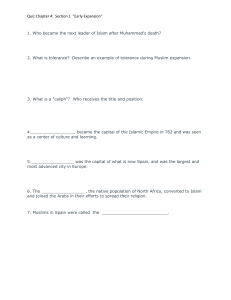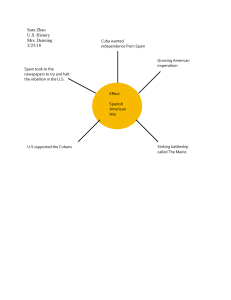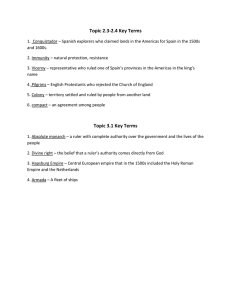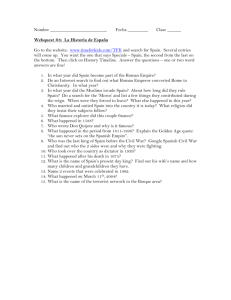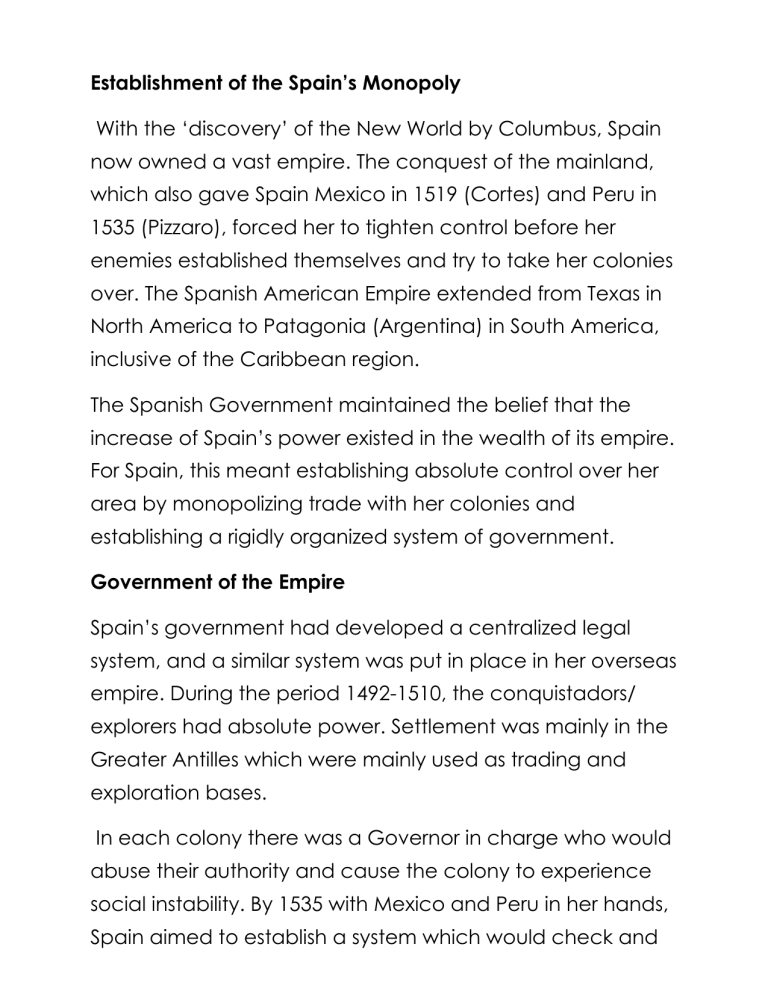
Establishment of the Spain’s Monopoly With the ‘discovery’ of the New World by Columbus, Spain now owned a vast empire. The conquest of the mainland, which also gave Spain Mexico in 1519 (Cortes) and Peru in 1535 (Pizzaro), forced her to tighten control before her enemies established themselves and try to take her colonies over. The Spanish American Empire extended from Texas in North America to Patagonia (Argentina) in South America, inclusive of the Caribbean region. The Spanish Government maintained the belief that the increase of Spain’s power existed in the wealth of its empire. For Spain, this meant establishing absolute control over her area by monopolizing trade with her colonies and establishing a rigidly organized system of government. Government of the Empire Spain’s government had developed a centralized legal system, and a similar system was put in place in her overseas empire. During the period 1492-1510, the conquistadors/ explorers had absolute power. Settlement was mainly in the Greater Antilles which were mainly used as trading and exploration bases. In each colony there was a Governor in charge who would abuse their authority and cause the colony to experience social instability. By 1535 with Mexico and Peru in her hands, Spain aimed to establish a system which would check and balance different officials. Individuals were placed in a position to spy and make reports on each official’s doings. The king was the head of the new system, who appointed the bishops and other officials for the New World. Supreme and final authority rested on him. The Council of the Indies and the House of Trade were established in Spain itself and the chief agent of control being the RCC (Roman Catholic Church). Council of the Indies ⮚ Began operating in 1511 but was established in 1524 ⮚ Appointed all top ranking positions and were responsible for supervising colonial affairs (officers were to be born in Spain) ⮚ Controlled all emigration to the New World ⮚ Was the administrative headquarters of the Empire ⮚ Regulated the relationship between Spain and her empire ⮚ Dealt with all colonial matters except Trade. House of Trade ⮚ Founded in Seville, Spain 1503-1707 ⮚ Responsible for management of trading-matters in the New World (Empire) ⮚ Controlled all economic activity ⮚ Supervised the convoy system (1560) which was designed to protect Spain’s Treasure laden vessels from sea robbers ⮚ Issued 'asiento' and other trade licenses ( ‘asiento’ was a coveted prize which fetched a high price) ⮚ Legalized the sale of slaves (slave trading was a lucrative business) ⮚ Change (levied) tax and duties Governance in the New World The Roman Catholic Church ⮚ Agent of Control in the New World ⮚ A powerful political, religious and economic institution ⮚ Present in every town and village ⮚ Held Inquisitions and tribunals e.g. Lima and Mexico 1570 ⮚ Supported royal authority in the New World ⮚ Managed the most important educational institutions e.g. the Jesuits built 23 colleges in Mexico ⮚ Built many hospitals and attended to the sick ⮚ Supervised the treatment of the Indians ⮚ Priests and nuns staffed orphanages, poor houses and hospitals ⮚ Checked heretic ideas in the courts (church) and hunted them down NB: Spain is a part of the Iberian Peninsula, hence all officials except the Cabildos were known as peninsulares Viceroys ⮚ Occupied the highest official position in the empire, although their authority could be over-ruled by the Judicial Audencias ⮚ Appointed by their King ⮚ Represents the king in the New World ⮚ Responsible for ensuring that laws sent from Spain were put into effect ⮚ Served for a term of 4-5 years ⮚ Required to hold a ‘residencia’ (public hearing) at the end of his office term Audiencias - legal ⮚ Sub-division of the vice royalties ⮚ Travelling law courts – ruled by judges, lawyers, notaries, professionally trained legal officers, rulers/leaders ⮚ Sent impartial reports and recommendations to the Spanish government ⮚ Kept close watch on colonial governor ⮚ Reported to the viceroys, carried out their instructions, advised them and could summon them before a court if necessary ⮚ Examined cases brought against Spain Provinces ⮚ Sub-division of the Audiencias ⮚ Ruled by governors ⮚ For 5 years served as good tax collectors for Spain ⮚ Empowered to discipline any colonial governor acting contrary to Imperial policy NB: In order to ensure colonial officials were absolutely loyal to Spain, an emissary or a commissioner would be sent to the Empire to inspect and report on royal officials Governors ⮚ In charge of a specific colony ⮚ Appointed by the King for a specific term ⮚ Received instruction from Spain Cabildos ⮚ In charge of local govt. - roads, bridges, levy local taxes, appoint local magistrates and regulate market prices ⮚ Members all creoles who communicated directly with the crown ⮚ Supervised Repartimiento ⮚ Worked with councilors and majors Marsha McIntyre revised 2020

